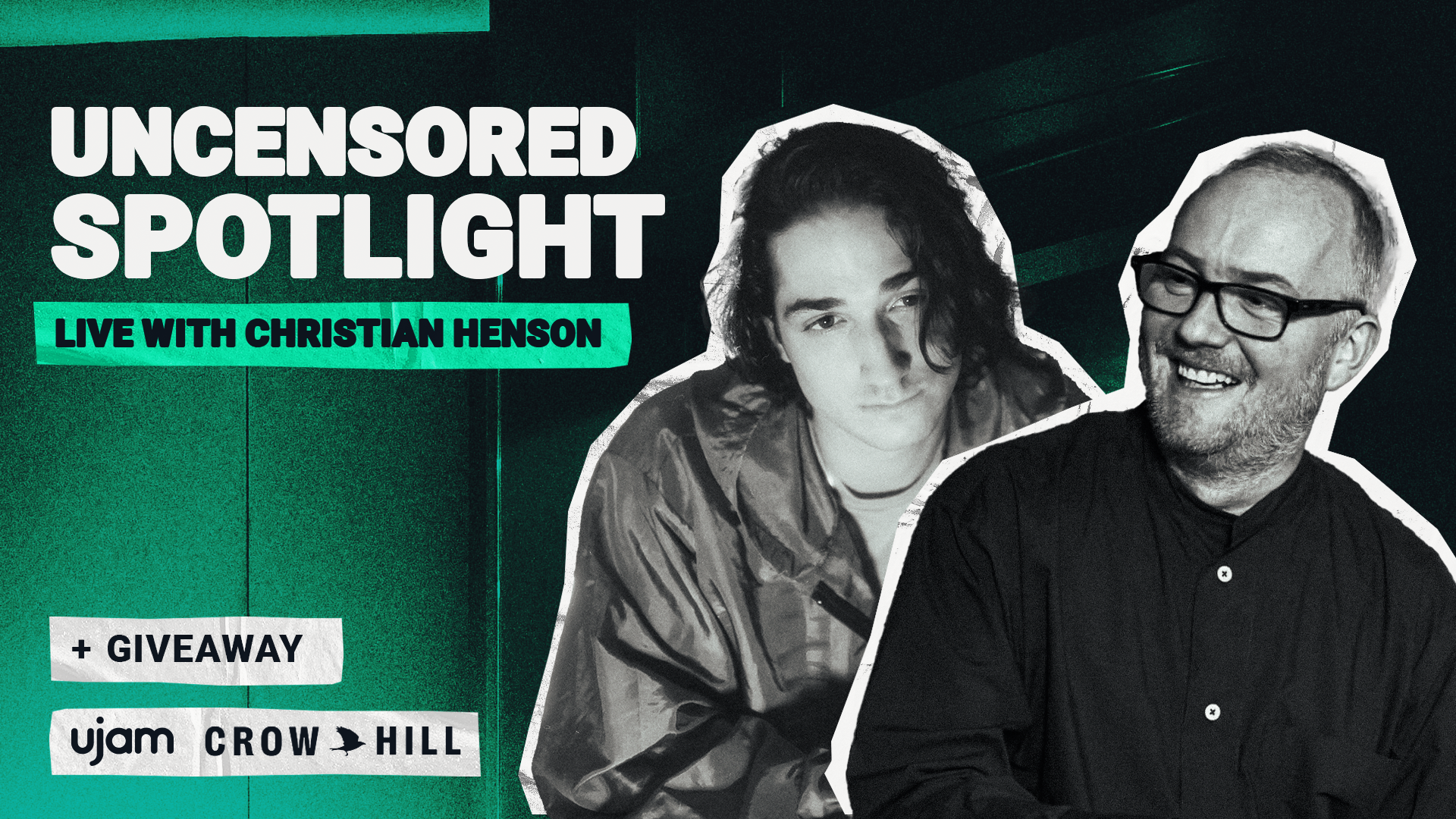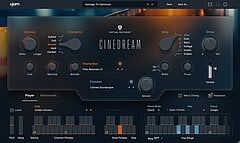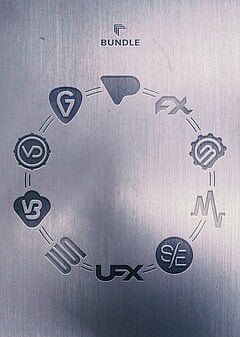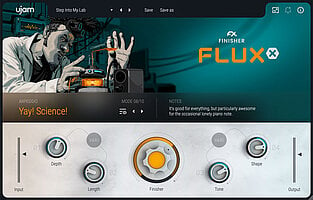“Never Score the Money Shot!”
An Uncensored Spotlight on Christian Henson
MAY 15TH, 2025
Christian Henson is a BAFTA-nominated, Ivor Novello–nodded, genre-hopping renegade whose fingerprints are all over the modern scoring landscape. He’s scored everything from cult TV (Inside No. 9) to blockbusters (Triangle, Severance (2006)), rebranded the Top Gear theme achieving jingle legend status, co-founded Spitfire Audio, and now heads the boutique sample lab Crow Hill Company.
But he is more than just a trailblazing composer and sampling pioneer, he also spent his entire career doing exactly what we believe in—making music creation easy, boundary-free, and accessible to anyone with a laptop and an attitude.
Crow Hill burst onto the plug-in scene about 18 months ago; their products are based on UJAM’s Gorilla Engine and we’re stoked to have helped launch this extraordinary creative venture. In this article we take a closer look at Christian and his unusual (to say the least) professional path becoming one of the contemporary greats in both film scoring and music tech.
🎥 Live with Christian & Adam:
Mark your calendar for Monday, May 19th, 6:30 pm CEST — Christian and UJAM’s Adam will go live, unfiltered and probably uncensored. Expect scoring insights, war stories, giveaways, and a lot of swearing.
A Composer Who Never Learned to Read Music (And Doesn’t Give a Damn)
His origin story reads like a mash‑up between Trainspotting and Whiplash. Eldest son of British screen legends Una Stubbs and Nicky Henson, he ditched academia, baked bread for three years, survived a brain haemorrhage at 25, and taught himself synthesis on an Atari ST long before software instruments were a thing.
He scored porn, jungle, and orchestras — in that order — and built a career on curiosity, grit, and not giving a single damn about gatekeeping. Henson embodies the punk spirit of just plugging it in and figuring it out later.
“I think it's a personal vendetta I have against the snobs who once told me I’d end up waiting tables because I never learned to read music. Now I score orchestras from my laptop on the beach in Crete.” — Christian Henson
An Unorthodox Path: From Jungle to John Williams (Well… Kinda)
In 1987, 16‑year‑old Christian bought a sampler instead of a car. That decision hurled him into London’s underground rave scene where he programmed breakbeats for legends like LTJ Bukem alongside the late MC Conrad. He learned quickly to embrace creativity without boundaries. "There was an open-mindedness about it," Christian recalls, emphasizing how the genre’s fusion of styles and sounds influenced his compositional instincts. That same gear landed him an unlikely gig: composing soundtracks for “educational” hardcore porn (British obscenity laws required a two‑minute doctor’s intro, then anything — anything — went).
“Rule #1: Never score the money shot. You don’t put trumpets over that.”
Yep, that’s a direct quote. The job paid the bills, sharpened his sampling chops, and — irony of ironies — prepped him for orchestral film work when the industry suddenly needed electronic drum programmers.
“The spotting sessions were… interesting,” Christian laughs. “But the production values were actually quite high. It wasn’t just smut — it was weirdly professional. I learned how to work fast, hit emotional beats, and yes, never score the money shot. That’s a rule.”
And yeah, he was doing all of it on an Atari ST with a home sampler while the rest of the world still thought MIDI was witchcraft. But even then, his professional attitude to craft was clear—no job was too small, nor too unusual, as long as he could deliver high-quality music.
When Drum & Bass met orchestral music in the late ’90s — thanks to artists like Massive Attack, David Arnold, and the rise of sample-driven hybrid scores — the industry suddenly needed electronic programmers who could work fast and think cinematically.
Christian fit the bill.
“Suddenly orchestral composers desperately needed drum programmers. I was already scoring to picture, I had the gear, and I was hungry. I got in through the back door, and I’ve stayed ever since.”
Kicking Down the Studio Door
By the late ’90s Henson had earned assistant stripes under Dudley, Gregson‑Williams, and Patrick Doyle, eventually re‑branding the Top Gear theme you still hear today. That single credit financed his leap into full‑time scoring, culminating in cult slasher Severance (2006) and the endlessly inventive anthology Inside No. 9 — a gig he calls “some of the best television I’ve ever seen, let alone worked on.”
Despite an impressive portfolio, Christian remains refreshingly modest about his role in the industry. “I see myself more as a craftsman than an artist,” he says. His goal has always been to bring something uniquely suited to each project, blending artistry and craftsmanship effortlessly.
“Passive income is nice,” he laughs, “but the real joy is hearing a kid hum something you wrote while they’re queuing for coffee.”
His lack of classical training became an asset, fueling his desire to democratize music-making, especially orchestral music, through projects like Spitfire Audio and now the Crow Hill crew.
Tech Evolution and Creative Freedom: Why Spitfire Happened—and Why Crow Hill Matters
Over the past three decades, Christian has witnessed first-hand how technology revolutionized composing. Henson co‑founded Spitfire Audio to let non‑readers (like himself) write orchestral music without begging for live players. Spitfire’s mission: record world‑class players at AIR Lyndhurst and put those multisampled instruments on your hard drive — no conservatory degree required.
Today Spitfire is a staple in Hans Zimmer blockbusters and bedroom laptops alike, but Henson stepped back in 2023 and fired up The Crow Hill Company — a boutique lab creating private sample sets and custom scores for clients who crave sounds no one else owns.
Today, with Crow Hill, he’s doubling down on boutique, bespoke sampling—crafting private instruments from his mountain of rare synths and outboard gear, then carting nothing but a laptop on holiday. “These laptops have set us free,” he grins. “I can deliver stems from Crete while my kids raid the buffet.”
His advice? Build your sound, then unplug the rest. “Computers belong off to the side.
Music needs space.”
Craft vs. Construction — Why One Live Player Beats 200 Kontakt Tracks
“I remember doing a horror score and the director told me, ‘Christian, the music isn’t scary enough.’ So I added more sounds. And he went, ‘No — I said the music isn’t scary enough.’ That was a lesson. More layering isn’t the answer. Writing is.”
Samples are fantastic—until they’re not. Henson’s issue: modern scores drown in too many tracks and too much verb. Christian holds strong opinions about the current landscape of sample-based scoring, emphasizing the importance of incorporating live instruments.
“There’s never an excuse not to use at least one live player. That 1 % of live input adds 100 % of the vibe.”
He's equally candid about the over-reliance on digital convenience. Christian warns of the dangers of "over-orchestrating and under-composing," where composers pile layers and effects without considering the emotional impact of the composition itself.
Despite embracing digital tools, Christian’s workflow remains distinctly hybrid. "I divide my workflow into two segments," he explains. He creates unique sample sets with his impressive hardware collection, ensuring a distinct, personalized sound palette. Then, when deadlines loom, he switches to in-the-box methods for speed and efficiency.
“My brain’s got a three-and-a-half-hour fuel tank—after that I’m writing emails, not music.”
Creativity is a sprint, not a marathon. Henson caps his serious composing to 3–4 focused hours per day, phones off, DAW glowing. The rest of the time? Walk, think, or tweak templates—but don’t pretend 18‑hour days make better art.
He swears by walking over tweaking.“Some of my best ideas come when I’m not even at the computer. Computers were made by accountants. You want emotion? Go outside, then come back and write fast.”
He artificially limits his template on every project, forcing himself to compose, not layer‑surf. “Starve people of resources and they become more resourceful,” he says.
Killing the Amen Break: Hot Takes & Mic Drops
- 25 years later, we’re still looping the Amen break. “Have we not had enough of that yet?” he groans. Same.
- Listening habits trump gear lust. “Your music is only as good as the music you listen to.” Translation: feed your ears the good stuff, not algorithm sludge.
- AI will sort the dabblers from the lifers. If a bot can do what you do, try harder—or go sell presets.
“Own Your Weird” or Advice for Aspiring Composers
Henson criticizes the current trend of chasing popular sounds, particularly mimicking industry giants like Hans Zimmer. "The only guarantee someone will like your music is if you like it yourself," he adds, advocating for authenticity and self-awareness as essential to creative success.
When asked about advice for newcomers, Christian offers straightforward wisdom:
- Curate relentlessly. Trace the masters, not yesterday’s playlist.
- Limit your palette. Twenty‑five plugins ≠ twenty‑five ideas. A smaller toolset forces bigger ideas.
- Book one live player. Even Fiverr cello beats 64‑layer “Epic Legato v12.”
- Work in sprints. Three focused hours > twelve distracted ones.
- Own your weird. Henson’s career exists because he said yes to porn, breakbeats, and Bakers Pride ovens — then mashed it into orchestras.
- Work like a pro, swear like a sailor (optional). Confidence sells, but honesty sticks.
If you’re wondering why your tracks feel flat, Christian probably already knows why.
“Your music is only as good as the music you listen to. And I can hear it — I can tell when someone’s listening to algorithm sludge. It seeps in. You want better output? Feed your ears better input.”
Final Cue
Christian’s journey proves that formal training is optional, curiosity is mandatory, and a well‑timed “f*ck it” can bulldoze velvet‑rope gatekeeping.
Looking ahead, Christian predicts exciting changes on the horizon, particularly driven by AI. Rather than viewing artificial intelligence as a threat, he sees it as a catalyst for a return to virtuosity and human authenticity in music. "The only music threatened by AI is music that AI can create," he challenges. His advice to composers in the face of technological advancement is blunt and motivational: "Try harder." Mic drop. And that’s not a diss. It’s a challenge.
Christian Henson’s journey, from drum & bass DJ to pioneering composer and technology innovator, demonstrates a passion for music that transcends genres, trends, and tools. As technology continues to evolve, Christian remains ahead of the curve, always pushing for creativity, craftsmanship, and authenticity in every note.
So close this tab, mute that Amen loop, and make something only you could make. The world has enough copy‑paste composers — and Christian Henson will personally clap back if you become one of them.
Christian isn’t just talking about democratizing music — he’s inviting you into the chaos. If you’re ready to take what you just read and put it into action, here’s your chance:
Mark your calendar for Monday, May 19th, 6:30 pm CEST — Christian and UJAM’s Adam will go live, unfiltered and probably uncensored. Expect scoring insights, war stories, giveaways, and a lot of swearing.
🎙 Crow Hill Podcast: Peter x Christian:
On May 22nd at 8PM CEST, our very own co-founder Peter Gorges will guest on Christian’s Crow Hill Podcast for a deep-dive conversation about creativity, tech, and tearing down the gatekeeping bullshit.
In other words: if this article lit a fire under your butt, these events will throw gasoline on it.
Stay up to date
Sign up and we’ll send you an e-mail with product news and helpful stuff every now and then. You may unsubscribe at any time.
Defy Limits
We develop software solutions that enable people to create, consume and interact with music.





